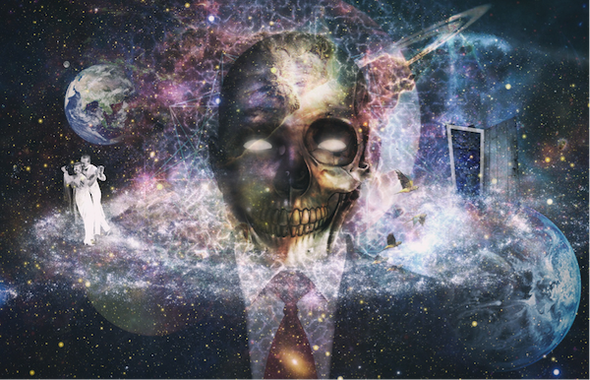People Continue to Live in the Good Deeds After They Die

As a memory scientist, I don't trust my memories of my own life. So, why should I trust memories of a deceased loved one? My grieving brain responds to this with "because I desperately want to," but I know this is a childishly flawed argument made in a moment of weakness.
If all memories can be flawed, as I argue at length in my book 'The Memory Illusion', then these memories can be too. There is no memory safe house that keeps our most cherished memories from corruption. All memories can be false memories, even memories of those we love most.
Because I consider writing cathartic, and enjoy gaining insight into my own internal processes by understanding the science behind them, let's talk about memories and death.
Mark
Here is the background behind this post. My stepfather, Mark, to whom I was exceptionally close, passed away suddenly six weeks ago. I was the first responder, with 911 on the line as I kept him breathing until the paramedics arrived. He had been in good health, so we suspected that everything would be fine. Then the medics told us he had suffered a blockage in his heart. My efforts had been in vain. In my memory of the event I can still see him where I found him at home, with his head against the glass and his eyes rolled back, breathing heavily. It was the last time I saw him alive.
Grief is the deepest emotion I have ever felt; a combination of devastation, despair, powerlessness, and existential fear. But it was not all bad, for in this darkest time I still found moments of light: the beautiful memories that remained of his life. I wanted to hold the memories. I wanted to touch them. I wanted them to materialize.
I was overcome with an immeasurable desire to tell and retell everyone who would listen about every moment I could remember spending with him. I saw this happening to all his family and friends. We desperately needed to keep his memories alive. Memories were all we had left of him.
But I encountered a conundrum that many others did not. I realized that much of what we were sharing as memories had probably never happened.
Reconstructive Narratives
Memory is often a social construction. Certainly in the context of grief, memories are often elicited and shared in group settings with family members and friends. Information is disclosed, information is absorbed, and memories change in the process.
According to psychological scientist Robert Neimeyer and his colleagues in 2014, grief involves "processes by which meanings are found, appropriated or assembled at least as fully between people as within them."
After the death of a loved one we look for meaning, we create meaning, and in the process we often agree with others on what a person's life must have been like. As Neimeyer and his colleagues say "a central task of grieving is the reconstruction of those narratives." From my own research, I can tell you that these reconstructive processes can be very creative, covertly weaving compelling pieces of fiction into the story of a life.
Mark, as the family remembers him, never existed until now. The family has created a past that never was, in our own attempt to understand our relationship with his death.
Like a mosaic, we all contribute the broken shards of our memories to a larger picture that, while imperfect, creates a beautiful whole life.
Complicated Grief
But it's not all pretty art analogies and family memories. Being touched by death also has the potential to adversely affect our memories. For one thing, we can have intrusive memories of the deceased that pop up when we don't want them to. I certainly keep thinking back to Mark's head against the glass.
In the worst cases, we can even experience something referred to as 'complicated grief.' According to memory scientists Donald Robinaugh and Richard McNally in a research paper published in 2013; "Complicated grief is associated with impairment in the ability to retrieve specific autobiographical memories."
In their research on the subject, Robinaugh and McNally recruited 33 participants who had lost a life partner within the last three years. They found that the 13 participants who met the criteria for complicated grief had trouble accessing specific memories of their lives, and they had difficulty imagining events in the future. This phenomenon was generally referred to as having 'overgeneral memory'.
However, the memories of the complicated grievers were only overgeneral when they did not involve the deceased. Memories involving the person who had passed away were comparatively intact.
Those who suffer from complicated grief seem to have memories that override the present, making them unable to concentrate or function in their normal lives. They lose themselves, and their memories of their own lives, and can only retain memories involving the person they have lost.
In my personal experience of grief I mostly doubted memories of another's life, whereas complicated grievers doubt memories of their own lives. Grief affects everyone differently, and this too applies to how it impacts our memories.
Death gives life meaning
So can we accurately remember someone's life after they die? I think not.
I think there are too many psychological processes and biases that enter once someone has passed away to believe that our memories of that person can possibly remain unscathed.
But that's OK. One must only look at the average eulogy to see that we usually remember our loved ones in the best (im)possible light. We should all be so lucky to be remembered as the best version of ourselves, even if this version is partially the result of distorted memories.
As for my own grief, I will forever cherish all my true and false memories of Mark.
The views expressed are those of the author(s) and are not necessarily those of Scientific American.
Source: https://blogs.scientificamerican.com/mind-guest-blog/how-well-can-we-remember-someone-s-life-after-they-die/
